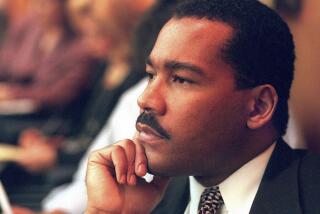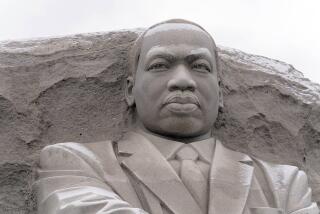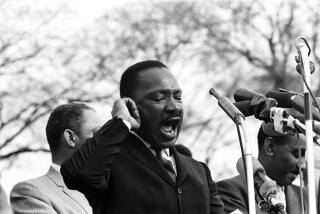King’s Legacy
Had he lived, Dr. Martin Luther King Jr. would have celebrated his 60th birthday today. He would be proud of the progress that has resulted from the civil-rights movement that he led. Legal segregation by race is prohibited. Laws safeguard equal opportunity in the workplace, in housing, in schools, in the courts, at the polls, in every public arena.
Black Americans have made spectacular individual gains since King’s assassination in 1968. Elected officials, lawyers, doctors, entrepreneurs, journalists--the list of black achievement goes on and on. The future holds even greater promise for black children.
“I am free to become a lawyer, a doctor or even a judge because Dr. Martin Luther King Jr. marched for justice, peace and freedom for all,” wrote Lana Wade, 9, a fourth-grader at Western Avenue School. “I might even become governor of one of our 50 states such as Pennsylvania . . . . I can be a preacher, a teacher, mother or even Ms. Texas.” Her essay was a winner in the annual contest sponsored by the Los Angeles branch of the Southern Christian Leadership Conference, the national civil-rights organization founded by King 30 years ago.
But as a recent Times series, “The Racial Gap,” points out, neither fame nor fortune can immunize the successful members of minority groups from old prejudices.
The new form of racism may be more subtle, but the assumptions are the same. Atlanta Mayor Andrew Young comes out of the Waldorf-Astoria Hotel in New York and a guest assumes that he isa parking attendant. A popular black broadcaster moves into a wealthy Miami neighborhood and a neighbor assumes that she is the cleaning lady. A black pediatrician practices in Washington, D.C., and white colleagues assume that her patients are poor, teen-age mothers. The insulting misperceptions are not harmless. The slights can take an even greater toll when the stale stereotypes carry over into the workplace or into social situations.
When integration was a novelty, Americans seemed to make a greater effort to integrate socially. With the passage of time, that is no longer the case. Minorities often seem invisible at major social events. Although mingling at a cocktail party may seem a small matter, being ignored exacts a penalty higher than simply spoiling a good time. Social contacts are often essential to job advancement and business.
King fought for opportunity--an equal shot at decent jobs, housing, schools, futures. There have been gains. And losses. Millions of black Americans, an underclass, live in poverty. As the nation pays tribute to the civil-rights leader on his birthday, Americans must again make a conscious effort against racism of every kind and degree.
More to Read
Sign up for Essential California
The most important California stories and recommendations in your inbox every morning.
You may occasionally receive promotional content from the Los Angeles Times.










